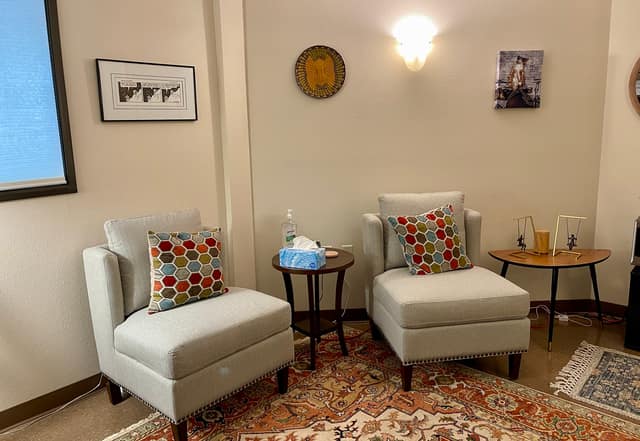
Taking the first step towards therapy can be daunting. I want you to know that you’re not alone. I’m here to help you navigate the complexities of emotional and relational challenges. Here’s a list of what I commonly get asked by potential new clients:
What to Know
Are You Currently Accepting New Clients?
Yes, I am currently accepting new clients for therapy appointments.
My practice is open to both individuals and couples who are 18 years and older. I’m committed to providing a supportive and transformative space for all my clients, helping them navigate their unique journeys with empathy and expertise.
Can I meet with you in-person?
I have an office at 2440 Willamette Street in Eugene, Oregon where I can meet with clients in-person.
My goal is to keep you safe as well from illness (cold, flu, RSV & COVID-19). To ensure a safe and comfortable environment for in-person sessions, I strive to adhere to safety protocols, including social distancing, HEPA filtration and circulating fresh, outdoor air with an open window and fan.

Are virtual appointments as good as meeting in-person?
Telehealth (virtual) offers the same level of effectiveness as in-person sessions, providing a convenient and accessible option for clients seeking quality therapy.
While some may believe that virtual sessions are less personal or effective, research has consistently shown that teletherapy can be just as beneficial as traditional face-to-face therapy. In fact, many clients find that virtual sessions offer unique advantages, such as increased comfort and openness, as they can participate from the safety and familiarity of their own space. Additionally, virtual therapy eliminates the need for commuting, making it easier to fit sessions into busy schedules and allowing for greater continuity of care.
Are virtual appointments a good idea for couples therapy?
Online couples therapy is just as effective as in-person sessions.
This is particularly beneficial for partners who are not in the same location, such as one being at work and the other at home, as it eliminates the need for coordination and commuting. Even with virtual sessions, an experienced therapist can create a warm, supportive, and interactive environment.
Can My Partner and I Be in Different Locations?
Couples can be in two locations while doing virtual therapy.
This flexibility ensures that both of you can participate in the sessions, regardless of your whether one of you is at home and the other is on a break at work, making accessing a therapist more accessible and convenient.
How Long Does Therapy Take?
On average, clients attend therapy for 8-12 sessions.
The duration of therapy varies as it is highly personalized to each situation based on your unique challenges and goals. My approach is focused on facilitating meaningful progress efficiently and effectively. However, the length can vary: some may find that a shorter period meets their needs, while others might benefit from a longer duration, especially in more complex situations.
What Are Your Qualifications and Experience?
I’m a Certified Gottman Therapist with over 20 years of experience.
My background as a Licensed Clinical Social Worker and Gottman Certified Therapist includes working extensively with relationship issues for both individuals and couples. This includes couples in marital or relationship distress, those dealing with recovery from emotional and verbal abuse, and those struggling with dysfunctional family dynamics.
What does an individual therapy session look like?
Individual therapy is a confidential, one-on-one process with a licensed mental health professional that provides a safe space for self-discovery, emotional growth, and the development of coping strategies to improve overall well-being.
Individual therapy, or psychotherapy, is a transformative journey where you work one-on-one with a licensed mental health professional in a confidential and supportive environment. This personalized process provides a safe space to explore your thoughts, emotions, and experiences, gain insights, and develop coping strategies for personal growth and navigating life’s challenges. Through evidence-based techniques like Cognitive-Behavioral Therapy (CBT) and Internal Family Systems (IFS), your therapist will guide you on a path of self-discovery, skill development, and emotional well-being, promoting positive change in relationships, career, and overall mental health as you work towards becoming your ‘Best Self’.
What does a couples therapy session look like?
Couples therapy is a powerful tool for partners to work with a licensed mental health professional, addressing conflicts, improving communication, and strengthening their emotional bond to build a more satisfying and resilient relationship.
Couples therapy, also known as marriage counseling or relationship therapy, is a form of psychotherapy that helps couples recognize and resolve conflicts, improve their relationship, and enhance their overall satisfaction with each other. In couples therapy, both partners work with a licensed mental health professional in a supportive and confidential environment to address the challenges they face together. The therapist guides the couple to help them develop effective communication skills, foster emotional connection, and build a stronger, more resilient relationship.
What is Gottman Method Couples Therapy?
The Gottman Method is a research-based couples therapy approach that enhances communication, manages conflict, and builds connection, tailored to each couple’s unique needs to foster a stronger, more fulfilling relationship.
The Gottman Method is a research-based approach to couples therapy developed by Drs. John and Julie Gottman, drawing upon over 50 years of study on what makes relationships succeed or fail. This comprehensive method focuses on enhancing communication between partners, teaching them to effectively express their needs and listen to each other, which is crucial for a healthy relationship. Through the Gottman Method, couples learn strategies for managing conflict constructively, strengthening their emotional bond, and building intimacy and connection. The therapy process begins with a thorough assessment of the relationship, allowing the therapist to tailor the approach to the couple’s specific needs and goals, ultimately helping them create a more satisfying and resilient partnership.
What is a Gottman Certified Therapist?
A Gottman Certified Therapist is a mental health professional with extensive training in the research-based Gottman Method, skilled in applying its principles to help couples enhance communication, manage conflict, and build a stronger, more fulfilling relationship.
A Gottman Certified Therapist is a mental health professional who has completed extensive training in the Gottman Method, a research-based approach to couples therapy developed by Drs. John and Julie Gottman. These therapists have demonstrated a deep understanding of the Gottman Method and are skilled in applying its principles and techniques to help couples improve their relationships.
Gottman Certified Therapists are equipped with the knowledge and tools to guide couples through a comprehensive assessment of their relationship, enhance communication skills, teach effective conflict management strategies, and foster emotional connection and intimacy. By working with a Gottman Certified Therapist, couples can benefit from a tailored, evidence-based approach to addressing their unique challenges and building a stronger, more satisfying partnership.
- Number of Certified Gottman Therapists in Eugene: 1
- Number of Certified Gottman Therapists in Oregon: 12
- Number of Certified Gottman Therapists in Arizona: 7
What is Cognitive-Behavioral Therapy (CBT)?
Cognitive-Behavioral Therapy (CBT) is an evidence-based, practical, and solution-focused approach that helps you identify and change negative thought patterns, leading to improved mood, reduced anxiety, and more positive behaviors.
Cognitive-Behavioral Therapy (CBT) is a widely used, evidence-based form of psychotherapy that focuses on exploring the interconnected relationship between your thoughts, feelings, and behaviors. This practical and solution-focused approach helps you identify and challenge negative or distorted thought patterns that contribute to emotional distress and problematic behaviors. By learning to recognize and modify these thoughts, you can develop more balanced and helpful ways of thinking, leading to improved mood, reduced anxiety, and more positive actions.
CBT provides you with a powerful toolkit of strategies and techniques, such as cognitive restructuring, behavioral activation, and exposure therapy, which can be tailored to address a wide range of mental health concerns, including depression, anxiety disorders, phobias, and more. Through collaborative work with your therapist, CBT empowers you to become your own therapist, equipping you with the skills to navigate life’s challenges and maintain long-term emotional well-being.
What is Internal Family Systems (IFS)?
Internal Family Systems (IFS) views each person as being made up of different, conflicting parts. Just like members of a family, these inner parts can sometimes be in conflict or have different agendas, leading to internal struggles and emotional distress.
What is the Difference Between Therapy and Life Coaching?
The feedback I’ve received from my clients is that, by far, they prefer coaching over therapy. As a result, I offer both.
The primary difference between therapy and life coaching lies in their approach to addressing challenges and fostering personal growth.
With therapy, the focus is often on exploring and resolving underlying emotional issues, past traumas, or psychological patterns that may be contributing to current difficulties. For instance, if you’re dealing with a fear of being judged by others, a therapist would work with you to examine the origins of this fear, discuss the hidden feelings and beliefs associated with it, and help you develop a new perspective on the issue. This process may involve delving into your past experiences, identifying unhelpful thought patterns, and developing coping strategies to manage the emotional impact of the fear.
On the other hand, life coaching takes a more action-oriented, solution-focused approach to tackling obstacles and achieving specific goals. A life coach would approach your fear of being judged by assessing how it is currently impacting your life, helping you envision what meaningful change would look like, and collaborating with you to develop practical strategies to overcome the fear. While therapy tends to address mental health concerns, emotional healing, and the resolution of deep-seated issues, life coaching focuses on goal-setting, performance enhancement, and navigating specific challenges in various areas of life, such as career, relationships, or personal development.
